German Shepherd Breed Overview
The Ultimate Guide to German Shepherds
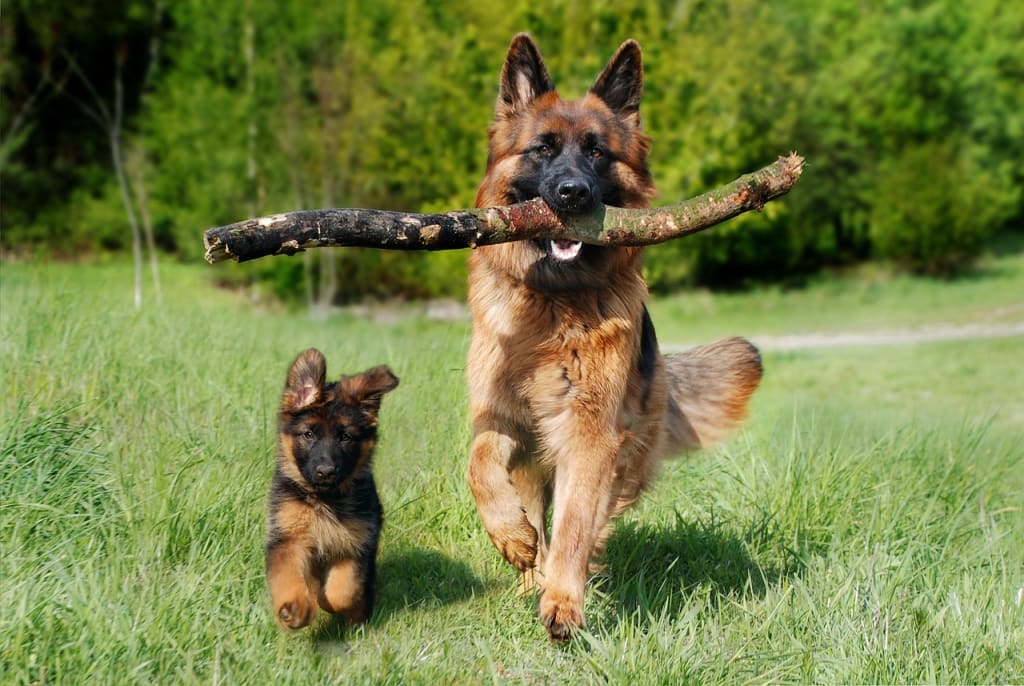
One of the most well-liked and adaptable dog breeds in the world is the German Shepherd. German Shepherds have a well-earned reputation for being outstanding police and military dogs, search and rescue partners, and devoted household pets. They are known for their intelligence, devotion, and impressive working qualities.
In this comprehensive breed overview, we will delve into the history, characteristics, training needs, health considerations, and more, providing you with a complete understanding of the German Shepherd breed.
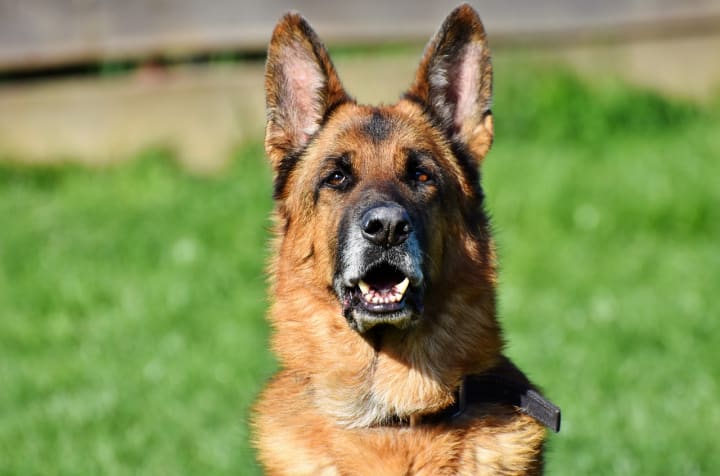
History of the German Shepherd Breed
German Shepherds were first developed in the late 19th century. The breed is claimed with being created by German cavalry officer Captain Max von Stephanitz. The multipurpose working dog he aimed to produce would have great herding skills. Because of their intellect, power, and agility, German Shepherds are outstanding livestock herders and guards due to their protective instincts.
Physical Characteristics
German Shepherds are medium to large-sized dogs with strong and muscular build. They have a distinctive appearance with a noble and intelligent expression. Here are some key physical characteristics of the breed:
Size: German Shepherds typically stand between 22 to 26 inches tall at the shoulder and weigh between 50 to 90 pounds, with males being larger than females.
Coat: They have a double coat consisting of a dense, straight or slightly wavy outer coat and a thick undercoat. The most common colour is the classic black and tan, but German Shepherds can also come in other colour variations such as sable, all-black, or all-white.
Ears: German Shepherds have erect, triangular-shaped ears that contribute to their attentive and alert appearance.
Tail: They have a long, bushy tail that hangs down when at rest but is raised when the dog is in action.
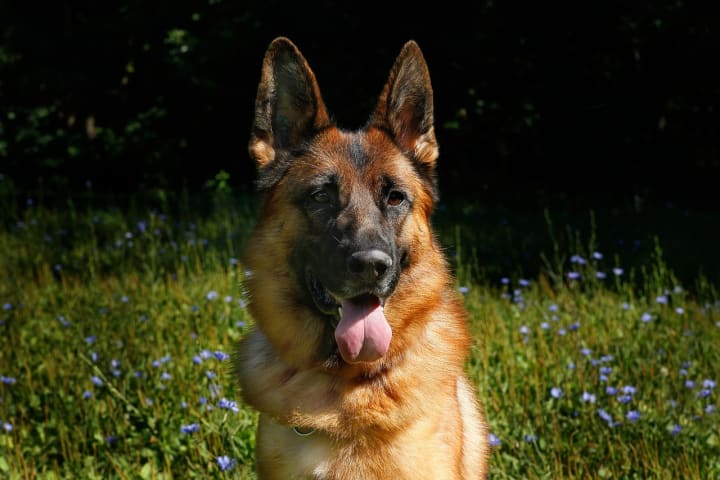
Temperament and Personality
German Shepherds are known for their loyal, confident, and intelligent nature. They are highly trainable and have a strong desire to please their owners. Here are some key aspects of their temperament:
Protective: German Shepherds have a natural protective instinct, making them excellent watchdogs and loyal family companions.
Intelligent: They are among the most intelligent dog breeds, ranking high in trainability. Their ability to learn quickly and retain commands makes them suitable for various working roles.
Energetic: German Shepherds are an active breed and require regular exercise to keep them mentally and physically stimulated. Long walks, playtime, and interactive training sessions are necessary to prevent boredom and behavioural issues.
Family-oriented: Despite their protective nature, German Shepherds are typically good with children when properly socialised. They can form strong bonds with their human family members.
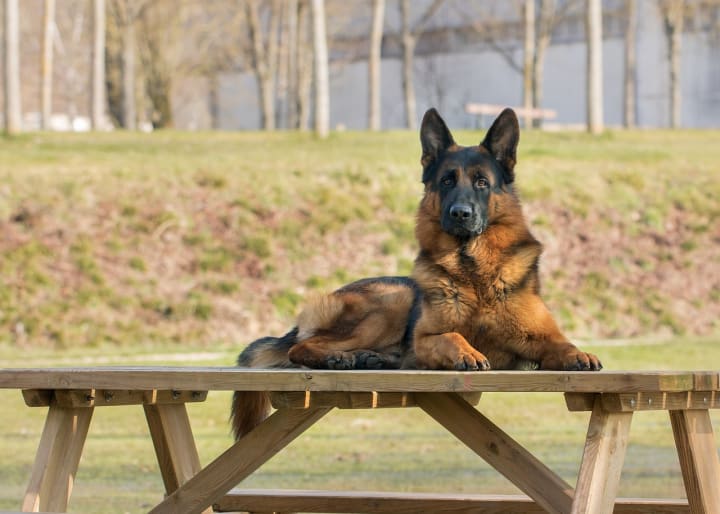
Training and Socialization
Training and socialization are crucial for German Shepherds to thrive as well-behaved companions. Here are some key training and socialization tips:
Start early: Begin training and socialization as early as possible to establish good habits and prevent behaviour problems.
Positive reinforcement: Use positive reinforcement techniques such as treats, praise, and play to motivate and reward your German Shepherd during training sessions.
Consistency: Be consistent with your commands, rules, and expectations to avoid confusion. German Shepherds respond well to a structured training routine.
Socialization: Expose your German Shepherd to various people, animals, and environments from a young age. This helps them develop into well-rounded and confident dogs.
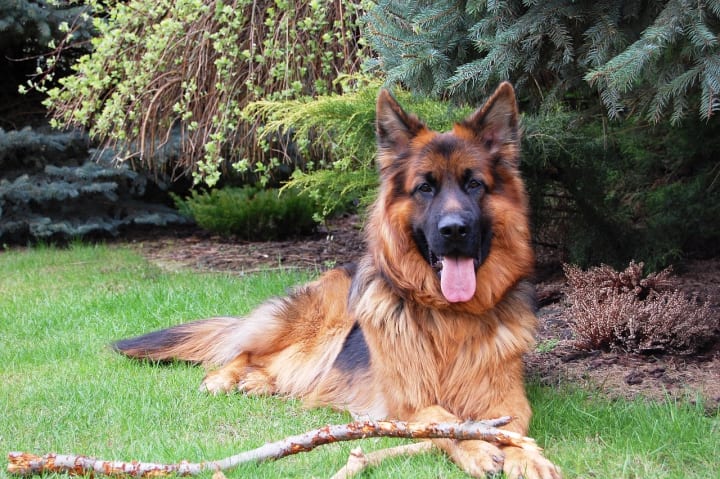
Health Considerations
German Shepherds are generally a healthy breed, but they are prone to certain health conditions. It's essential to be aware of these potential issues and take appropriate measures to keep your German Shepherd in optimal health. Here are some common health considerations for the breed:
Hip and elbow dysplasia: German Shepherds are susceptible to hip and elbow dysplasia, which are developmental conditions affecting the joints. Regular exercise, a balanced diet, and appropriate weight management can help reduce the risk.
Degenerative myelopathy: This is a progressive neurological disease that affects the spinal cord, leading to mobility issues. Genetic testing is available to identify carriers of the disease.
Exocrine pancreatic insufficiency: Some German Shepherds may have an impaired pancreas, resulting in difficulties digesting and absorbing nutrients. Enzyme supplements can help manage this condition.
Bloat: Like many deep-chested breeds, German Shepherds are prone to bloat, a potentially life-threatening condition. Feeding multiple smaller meals, avoiding vigorous exercise after meals, and using elevated feeding bowls can help reduce the risk.
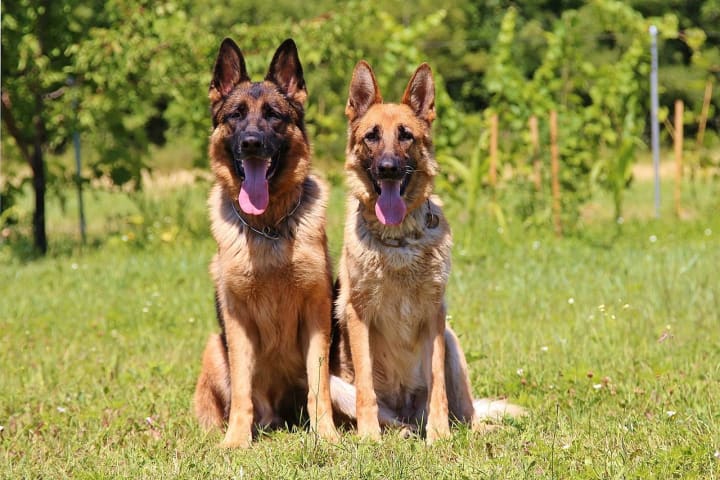
Frequently Asked Questions
1. Are German Shepherds good with children?
Yes, German Shepherds can be excellent companions for children when properly socialized and trained. They are generally protective of their family members and can form strong bonds with children.
2. Do German Shepherds require a lot of exercises?
Yes, German Shepherds are active and require regular exercise to prevent boredom and behaviour issues. Daily walks, playtime, and mental stimulation are essential for their overall well-being.
3. Can German Shepherds live in apartments?
While German Shepherds are adaptable, apartment living may not be ideal for them due to their size and activity level. They thrive in homes with a fenced yard where they can get ample exercise and space to move around.
4. Do German Shepherds shed a lot?
Yes, German Shepherds have a dense double coat that sheds moderately throughout the year. Regular brushing can help manage shedding, but expect some hair around the house, especially during shedding seasons.
5. Are German Shepherds prone to aggression?
German Shepherds, when properly bred, socialized, and trained, are not inherently aggressive. Aggression is typically a result of poor breeding, lack of socialization, or inadequate training.
6. How long do German Shepherds live?
On average, German Shepherds have a lifespan of around 9 to 13 years. Providing them with proper care, nutrition, exercise, and regular veterinary check-ups can help maximize their lifespan.

Conclusion
The German Shepherd breed offers a combination of intelligence, loyalty, and versatility that makes them highly sought after as working dogs and beloved family pets. Their history, physical characteristics, temperament, and training needs all contribute to their unique appeal.
However, it's crucial to remember that individual dogs may vary in temperament and health. If you're considering adding a German Shepherd to your family, ensure you have the time, resources, and commitment to meet their needs. With proper care, training, and socialization, a German Shepherd can bring immense joy and companionship to your life.






Comments
SUMAN KUMAR MISHRA is not accepting comments at the moment
Want to show your support? Send them a one-off tip.